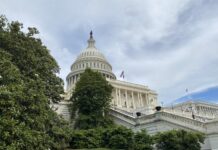
(Georgia Recorder) — Georgia senators will get one last chance this year to pass a divisive bill that spells out legislative committee investigative powers to subpoena witnesses and require them to turn over evidence.
The Senate could take up the latest version of Senate Bill 255, which cleared the House Wednesday by a 91-67 vote following a debate over whether legislative power to conduct probes could be wielded as partisan political attacks against public officials and advocacy groups.
Rep. Rob Leverett, an Elberton Republican, said Wednesday that the measure does not expand current legislative powers but instead provides more explanation into how committees are able to legally exercise their subpoena powers in a transparent manner.
The bill was filed while Athens Republican Sen. Bill Cowsert chaired a Senate special investigative committee that became embroiled in a legal battle over the right to issue subpoenas compelling Fulton County District Attorney Fani Willis to testify and turn over a trove of documents related to the election interference case she brought against President Donald Trump and 18 codefendants.
The Senate special committee was convened last year after Willis came under fire last year when she admitted to a romantic relationship with the special prosecutor she hired to lead the sweeping felony election interference case following former President Joe Biden’s 2020 election victory.
House Minority Whip Sam Park argued Wednesday that SB 255 could be used by lawmakers to continue efforts like the Senate committee’s investigation of Willis despite a state appellate court recently disqualifying the Fulton district attorney from the case over prosecutorial misconduct accusations. Willis has said her relationship with special prosecutor Nathan Wade did not overlap with the time she retained him to press the case against Trump and his allies.
Park, a Lawrenceville Democrat, said future legislative committees could begin using its powers to “subpoena election workers, nonprofit leaders, poll observers while demanding private emails and phone records from individuals who never committed a crime but now they’re forced to testify under oath and spend thousands on legal defense.”
Park said GOP legislators with majority control of a chamber could also target advocacy groups they oppose on other hot button issues like women’s reproductive rights.
Cowsert’s Senate Special Committee on Investigations is also expected to begin a probe of former Democratic gubernatorial candidate Stacey Abrams’ ties to a voter registration nonprofit recently slapped with one of the largest campaign ethics fines ever levied by the state.
Earlier this session the Senate advanced Cowsert’s Senate Resolution 292, which would allow the committee to investigate the Abrams-founded New Georgia Project following a Jan. 15 settlement in a 2019 case alleging illegal campaign contributions to Abrams’ 2018 gubernatorial campaign.
In March, Cowsert said the committee’s purpose is not to target prominent figures in the Democratic Party, but is about holding candidates running for public office and nonprofits accountable for potentially using “dark money” to make illegal campaign contributions.
“We’re wanting to make sure we restore the faith in our in the public that you don’t have to worry in the future that funds donated to nonprofit advocacy tax-free organizations aren’t used illegally to collaborate support campaigns on either side of the partisan divide,” Cowsert said late last month.







